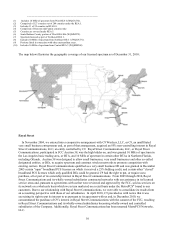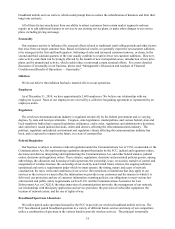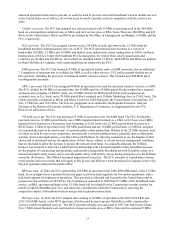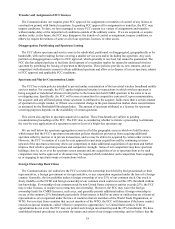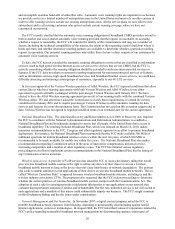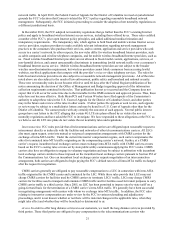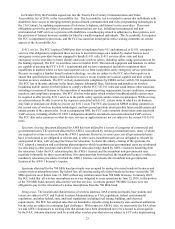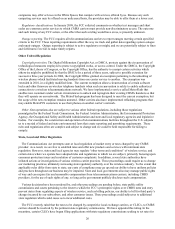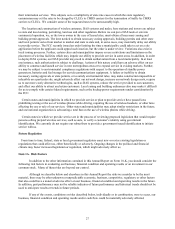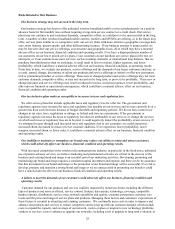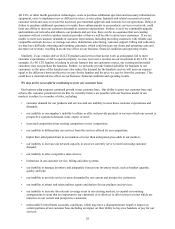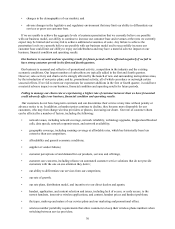Metro PCS 2010 Annual Report Download - page 30
Download and view the complete annual report
Please find page 30 of the 2010 Metro PCS annual report below. You can navigate through the pages in the report by either clicking on the pages listed below, or by using the keyword search tool below to find specific information within the annual report. 20
and accomplish seamless hand-offs of subscriber calls. Automatic voice roaming rights are important to us because
we provide service in a limited number of metropolitan areas in the United States and must rely on other carriers in
order to offer roaming services outside our existing metropolitan areas. All the service plans we now offer to new
subscribers (and to all existing customers who opt-in) include certain roaming coverage where we have not
constructed our network.
The FCC recently clarified that the automatic voice roaming obligations of broadband CMRS providers extend to
both in-market and out-of-market automatic voice roaming provided that the request is reasonable. In assessing
whether a request is reasonable, the FCC will consider the totality of the circumstances and may use a number of
factors, including the technical compatibility of the roamer, the extent of the requesting carrier's build-out where it
holds spectrum, and whether alternative roaming partners are available, to determine whether a particular roaming
request is reasonable. Our potential roaming partners may utilize these factors to deny requests of our customers for
automatic voice roaming services.
To date, the FCC has not extended the automatic roaming obligation to services that are classified as information
services (such as high speed wireless Internet access services) or to services that are not CMRS, but the FCC is
actively considering whether the roaming obligation should be extended to such non-interconnected services or
features. If the FCC does not adopt an automatic roaming requirement for non-interconnected services or features,
such as information services, high speed broadband services, and broadband Internet access services, we could have
difficulty attracting and retaining certain groups of customers, especially to our 4G LTE services.
In its recent approval of the Verizon Wireless purchase of Alltel Wireless, the FCC imposed conditions that allow
carriers like us who have roaming agreements with both Verizon Wireless and Alltel Wireless to use either
agreement to govern all traffic exchanged with the post-merger Verizon Wireless until January 2013. We have
elected to have the Alltel Wireless roaming agreement govern all of our roaming traffic with the combined Verizon
Wireless-Alltel. We and others have asked the Commission to clarify these requirements, to extend the current
commitment to January 2016 and to require post-merger Verizon Wireless to offer automatic roaming for data
services and features on a non-discriminatory basis. The Commission has not acted on this extension request and, to
date, Verizon Wireless has not agreed to negotiate modified terms or an extended date for the current agreement.
National Broadband Plan. The American Recovery and Reinvestment Act of 2009, or Recovery Act, required
the FCC to coordinate with the National Telecommunications and Information Administration, to establish a
National Broadband Plan and benchmarks designed to ensure that all people of the United States have access to
broadband capability. The resulting National Broadband Plan, which was released on March 16, 2010, makes
numerous recommendations to the FCC, Congress and other regulatory agencies in an effort to promote broadband
deployment. For instance, the National Broadband Plan recommends that the FCC make available 500 MHz of
additional spectrum for mobile broadband wireless services within the next ten years, of which 300 MHz is
recommended to be made available for mobile use within five years. The National Broadband Plan also makes
recommendations regarding Commission action in the areas of intercarrier compensation, universal service,
increasing competition, and a number of other regulatory issues. The FCC has initiated various regulatory
proceedings in an effort to implement certain recommendations in the National Broadband Plan, but the timing of
any Commission action is uncertain.
Wireless open access. A provider of VoIP services has asked the FCC to issue a declaratory ruling that would
give wireless broadband mobile customers the right to utilize any device of their choice to access a wireless
broadband mobile network as long as the device does not cause interference or network degradation. The petition
also seeks to enable customers to run applications of their choice on wireless broadband mobile networks. This so-
called “Wireless Carterfone Rule” is opposed by many wireless broadband mobile interests, including us and the
wireless industry association, CTIA. The proponent also requested that the FCC initiate proceedings to determine
whether the current practices of wireless broadband mobile carriers comport with the Communications Act. The
adoption of such a rule for existing networks could permit third parties to run applications on our network that
consume disproportionate amounts of airtime and/or bandwidth. Our flat rate, unlimited service is not well-suited to
such applications and a mandate of this nature could substantially impede our business. The FCC sought comment
on this Declaratory Ruling and has the issues under consideration.
Network Management and Net Neutrality. In November 2007, a digital content company asked the FCC to
prohibit broadband network operators from blocking, degrading or unreasonably discriminating against lawful
Internet applications, context or technologies. In August 2008, the FCC ruled that Comcast Corporation violated the
FCC’s policy regarding reasonable broadband network management by discriminating against certain types of


